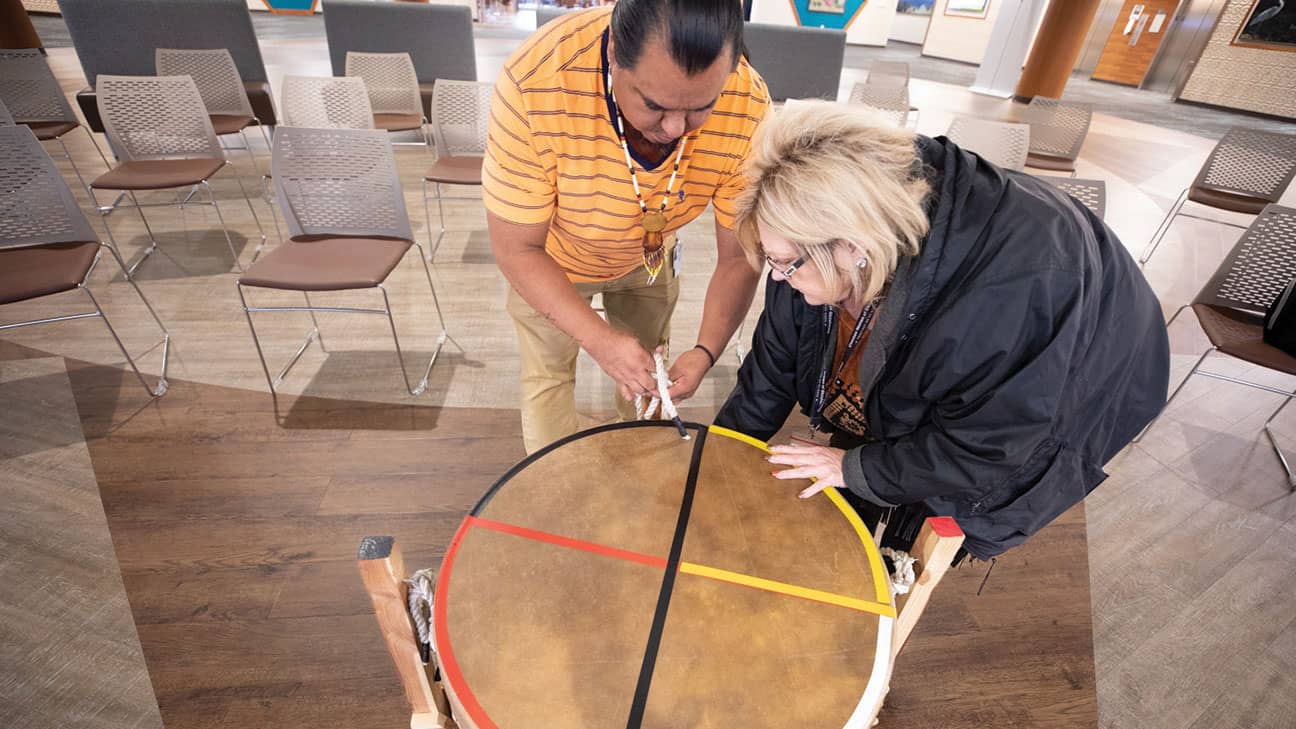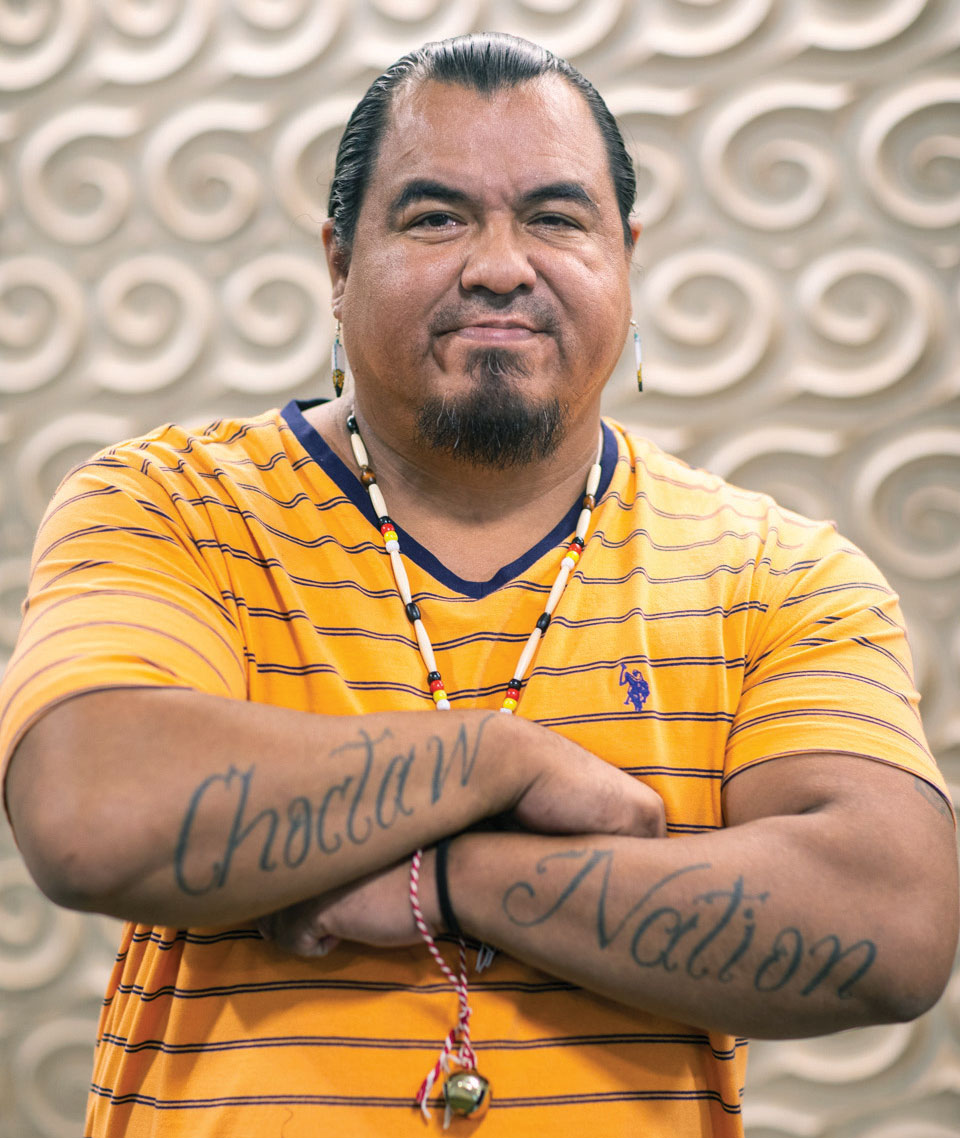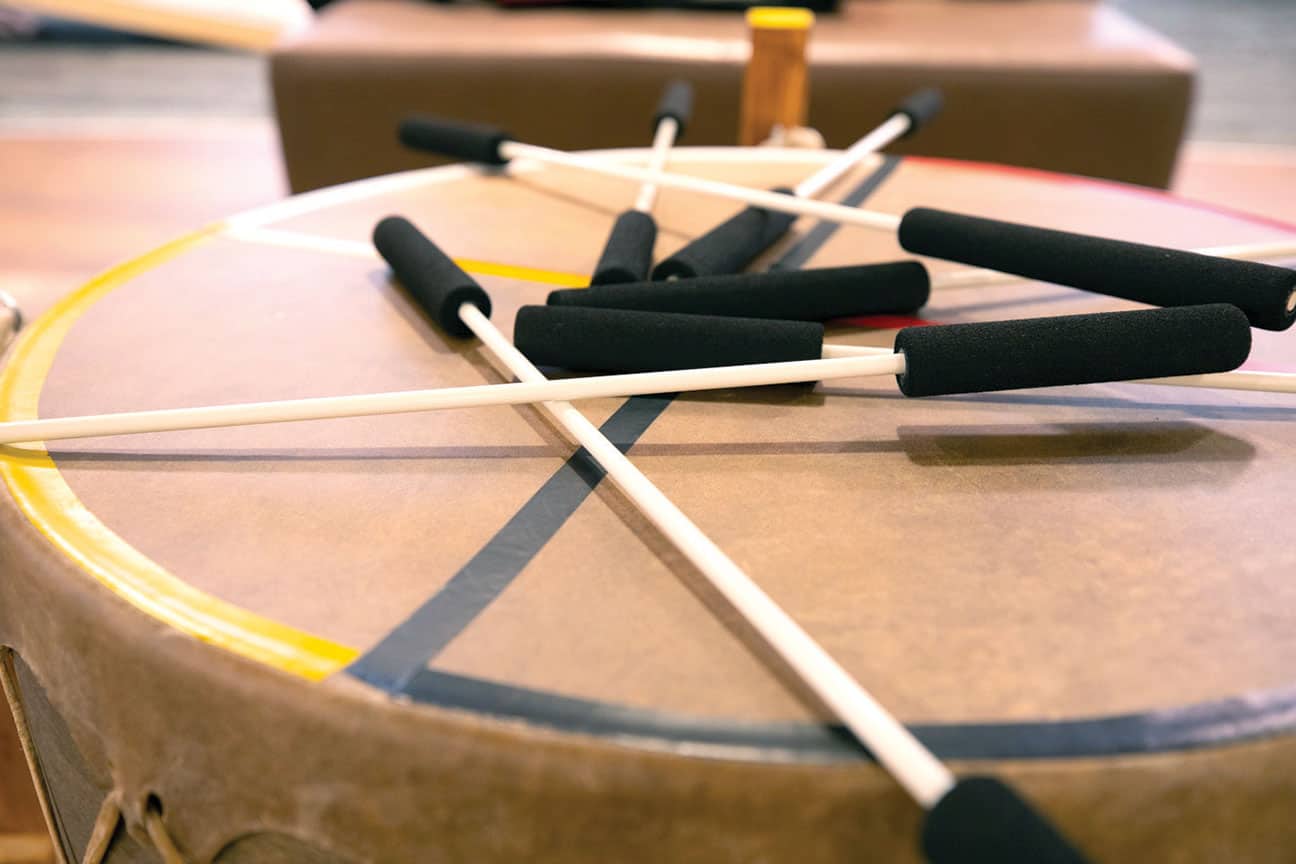
Weylin Thompson and his wife, Sharon, set up the drum for the drum circle recovery group at the Choctaw Nation headquarters. The recovery group meets at several locations throughout the Nation, with Antlers and Durant being open to everybody regardless of tribal affiliation.
Drum circle recovery group gives culture-based option for everyone
Published December 1, 2022By Chris Jennings
Addiction and substance abuse are significant issues in the Native American community. According to the Centers for Disease Control and Prevention (CDC), the rate of drug overdose deaths among Native Americans is above the national average.
There are several options for tribal members to get help with substance abuse and their recovery through services provided by the Choctaw Nation of Oklahoma.
Now there’s a culture-based option to help people with healing and potentially learn more about the Choctaw culture.
Weylin Thompson, a peer recovery support specialist with Choctaw Nation Behavioral Health, is helping both tribal members and non-tribal members get the recovery support they need with a monthly drum circle recovery group.
The group utilizes language and culture with the drum to help people along their path of recovery, no matter where they are on it. Currently, Thompson goes to the Stigler jail, the juvenile detention center, the men’s recovery center, Chi Hullo Li in Talihina, the Antlers Community Center and the Choctaw Nation headquarters in Durant. The Antlers and Durant drum circles are open to anybody who wants to attend.
The sound of the drum calls to many; it pulls at their heart and gives them a sense of comfort. The statement holds true not only for Native Americans, who have an ages-old relationship with the drum but anybody who feels the beat of the heart in the sound of the drum. “The drum has been around for ages, it’s the sound of a heartbeat, and that’s what it represents,” said Thompson.
Whether you envision each strike of the drumhead as the beat of an ancestor’s heart; or as a step along the Trail of Tears, or maybe to you, each strike of the drumhead represents each time the brothers Chata and Chicksah placed the pole in the ground as they traveled to find a new homeland. What matters is the carrying on of tradition and culture.
Thompson says this is important.
“The ancestor aspects of it is really important to me. Honoring the ancestors that paved the way for us to live like we do today, with flourishing and prospering people,” he said.
Thompson, who grew up in a foster home, was disconnected from his culture while he was growing up. He knew he was Choctaw and was around the culture a little but never really connected with it.
It wasn’t until Thompson started his journey with recovery that he found that piece that was missing in his heart.
Thompson said, “My counselor basically said you have to find something you’re more passionate about than drinking.” Now that he’s found that passion, he wants to share it.
Thompson says he wanted to start the drum circle recovery group to give people a safe place to heal.
“People with addiction need a place to talk, to share whatever’s on their heart… It [the drum] just speaks to your spirit; we want everybody to feel like they belong and that there is a safe place to recover,” said Thompson.

Weylin Thompson grew up knowing but not connecting with his Choctaw heritage. Now he wears that heritage with pride on his arms.
The last few years of the COVID-19 pandemic have been rough for the world.
According to a July 2022 CDC report, overdose deaths among Native Americans were disproportionately higher during the first year of the COVID-19 pandemic, outpacing whites during the same period. The report found that the disruptions in treatment and recovery services were behind the surge in overdose deaths.
The CDC report highlights the importance of recovery programs and how access to them can help in the recovery process.
The recovery drum circle is just one option to aid that recovery process.
The evidence of the effectiveness of drum circles is largely anecdotal. However, there are some clinical studies on using drums as complementary therapy.
One study found drumming enhanced recovery by increasing relaxation and helped with the release of emotional trauma.
Thompson says he sees the drum circle make a difference, and you don’t have to be Indigenous or active in the culture to benefit from the drumming.
“A lot of our clients aren’t connected culturally, and it’s something missing in their lives. When they hear the drum, and when they start learning songs in their language, it uplifts their spirit, and something makes a change in them,” he said.
Chad Coleman is a regular participant of the drum circle recovery group. He says that participating in sweat lodges and drum circles has positively changed him.
According to Coleman, he struggled over the years with various things, but that has changed.
“It’s really made me happier than I’ve ever been,” said Coleman. “Everything has just kind of come together; my heritage, my culture, my belief, it’s all come together.”
Coleman is a Christian and says he was saved in his 20s. Since then, God and the Bible have been an important part of his life.

Coleman says he struggled at times with being a Native Christian, though. “We were kind of raised to believe that some of the Native traditions like drum circles, sweat lodges and things like that aren’t Christ-based or Christian-based, that they’re some kind of Native Voodoo. It isn’t that at all,” said Coleman.
Thompson says the drum circle recovery group would be impossible without the help of Pastor Olin Williams, first speaker Dora Wickson and other elders.
“Without their help, without the elders and first speakers, I couldn’t be doing what I’m doing today,” Thompson said.
It was a higher calling that encouraged Thompson to sing the drum circle songs in Choctaw. He first attended drum circles sung in Lakota, and that’s how he knew to do them, but it was Chihowa (God) who he felt wanted him to sing Choctaw songs.
“I feel like Chihowa put it in my spirit. He said, you’re Choctaw, sing Choctaw songs,” said Thompson.
Coleman says he has felt empowered to help others by participating in the drum circle.
“It just gives me hunger to be strong for others; it makes you strive to be a better citizen on the daily,” said Coleman.
That desire to be a stronger and better citizen doesn’t just help Coleman; it helps everybody he comes into contact with and helps the Nation. By participating in the drum circle recovery group, Coleman, Thompson and everybody else involved are helping the Choctaw Nation be better and stronger by keeping its culture, traditions and language alive.